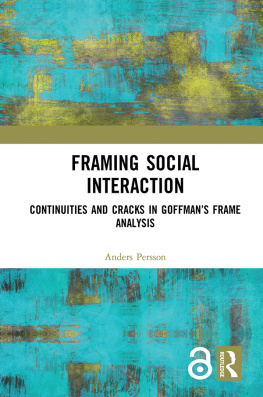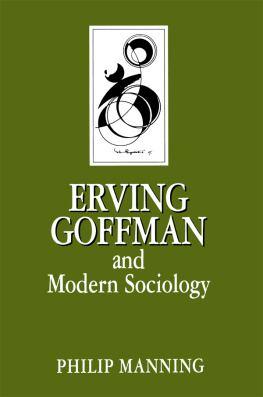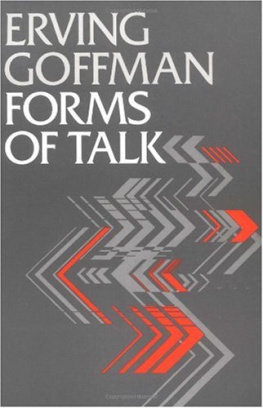Erving Goffman
While Erving Goffmans books are among the most widely read sociological works, covering issues including the presentation of the self, total institutions, and interaction order to frame analysis, they are in fact guided by a single theme: the analysis of the form of interaction in social situations and the role that individuals play in it. This book stresses Goffmans central role as a sociological theorist, exploring the potential of his work and uncovering the recondite layers of his oeuvre. In opening a path to understanding the complexity of his writings, it offers new directions for social theory and empirical research.
Jrgen Raab is Professor for Sociology at the University of Koblenz-Landau, Germany.
Knowledge, Communication and Society
Knowledge, Communication, and Society: Contributions to the New Sociology of Knowledge seeks to revive the academic collaboration and debates between European and Anglo-Saxon currents of thought in the social sciences that characterised the middle of the last century, and provide a forum for the development of a new sociology of knowledge. A space for transatlantic discussion, it includes original works and translations of central works by contemporary European social scientists and is committed to an empirically grounded programme of developing social theory.
Series Editors
Bernt Schnettler
Universitt Bayreuth, Germany
Hubert Knoblauch
Technische Universitt Berlin, Germany
Michaela Pfadenhauer
University of Vienna, Austria
Alejandro Baer
University of Minnesota, USA
Titles in this series
Social Constructivism as Paradigm?
The Legacy of The Social Construction of Reality
Edited by Michaela Pfadenhauer and Hubert Knoblauch
Erving Goffman
From the Perspective of the New Sociology of Knowledge
Jrgen Raab
For more information about this series, please visit: https://www.routledge.com/sociology/series/KCS
Erving Goffman
From the Perspective of the New Sociology of Knowledge
Jrgen Raab
First published in English 2019 by Routledge
by Routledge
2 Park Square, Milton Park, Abingdon, Oxon OX14 4RN
and by Routledge
52 Vanderbilt Avenue, New York, NY 10017
Routledge is an imprint of the Taylor & Francis Group, an informa business
Translated by Anna Brailovsky
2019 Jrgen Raab
The right of Jrgen Raab to be identified as author of this work has been asserted by him in accordance with sections 77 and 78 of the Copyright, Designs and Patents Act 1988.
All rights reserved. No part of this book may be reprinted or reproduced or utilised in any form or by any electronic, mechanical, or other means, now known or hereafter invented, including photocopying and recording, or in any information storage or retrieval system, without permission in writing from the publishers.
Trademark notice : Product or corporate names may be trademarks or registered trademarks, and are used only for identification and explanation without intent to infringe.
Published in German by UVK Verlagsgesellschaft 2014
British Library Cataloguing-in-Publication Data
A catalogue record for this book is available from the British Library
Library of Congress Cataloging-in-Publication Data
A catalog record has been requested for this book
ISBN: 978-1-138-36451-6 (hbk)
ISBN: 978-0-429-43132-6 (ebk)
Typeset in Times New Roman
by Deanta Global Publishing Services, Chennai, India
Originally published as Raab, Jrgen, Erving Goffman. Klassiker der Wissenssoziologie. Band 6, Konstanz: UVK, 2014.
This translation by Anna Brailovsky is published by arrangement with UVK Verlagsgesellschaft / Herbert von Halem Verlag.
Erving Goffmans status as a sociological theorist and the significance of his oeuvre were quite controversial during his lifetime. Soon after his death in 1982, however, he was already considered by many to be one of the leading post-World War II American sociologists (Manning 2000: 285). In retrospect, some even recognized him as one of the twentieth centurys most remarkable practitioners of social sciences (Smith 2006a: 1), if they did not quite elevate him to the status of the most significant American social theorist of the twentieth century (Fine & Manning 2000: 481).
Early on, interest in Goffmans work had already crossed not only the geographical borders of the USA, but also the boundaries of the professional discipline and, beyond thatperhaps most astoundinglythe usually insurmountable barriers and rifts between sociological paradigms. Today, then, Goffman clearly stands as a sociologist of classical stature (Hettlage 1991a: 437), even if, unavoidably, he can be only a classic of the second generation. No broad introduction to sociology or survey of its main representatives and chief works can afford to overlook Goffman. His writings have enjoyed a lasting popularity: they are translated into many languages, appear in multiple editions, and head the sociological bestseller lists worldwide. This is hardly surprising since, after all, they are received with a degree of interest accorded to few other representatives of the field, not only within but also outside the disciplineincluding by a broad, non-academic audience (cf. Didra 2010). Moreover, there are few sociologists, regardless of what theoretical camp or methodological orientation, who are not impressed by Goffmans acute powers of observation, the lucidity of his descriptions, the originality of his conceptualizations, and his absolutely extraordinary analytical talentsor, at the very least, by the exceptionally illustrative and entertaining qualities of his exposition.
On the rationale for this monograph
The ceaselessly growing number of introductory and survey texts that attempt to provide a systematic treatment of Goffmans oeuvre , however, points to a continual and persistently severe problem: Due to the clarity of his language, which is unencumbered by theoretical jargon, Goffmans writing is intuitively approachable and his vivid examples are easy to comprehend. His depictions and insights can frequently be borne out directly on the evidence of the readers own observations and confirmed in everyday experiencewith the often surprising effect that the familiar suddenly takes on a different aspect. Goffmans extraordinary capacity to bring to light what is unnoticed and unexposed, and at the same time to organize it, instantly makes the familiar and mundane seem unaccustomed, and it begins to dawn on us that even the most supposedly self-evident aspects of human social life are obviously not very self-evident at all. But the broader cohesion of the work is often difficult to ascertain for not only budding sociologists but also experienced practitioners of the discipline. For some, access to an inherent system appears to be so unwieldy and cumbersome that the possibility is denied from the start and Goffman is disqualified as sociological, if not completely unscientific (cf. Joas 1978: 38)a fate that Goffman shares with Georg Simmel, one of his most influential forerunners.
The reasons for this are varied. Within individual, predominantly essayistic writings, the expositions often seem loose and occasionally excessive and the categories and concepts appear to have been defined impressionistically. This perceptionand the additional impression of incompatibility and incoherencemay be reinforced when the social contexts from which the empirical examples are selected seem to vary randomly across all the individual studies, and it is exceptionally rare for Goffman to have recourse to terms and concepts he developed previously. Moreover, he does not even begin to make an effort to reflect on the traditions and lines of development that led to his work in order to at least hint at the possible connections motivating his theoretical deliberations and empirical work. Added to this is an ostensible disinterest in macro-sociological themes such as power, inequality, and social structure, which would have at least provided the reader with some rough guideposts to the work. This picture ultimately bears out the unwillingness Goffman proclaimed during his lifetime to be governed by disciplinary paradigms.










